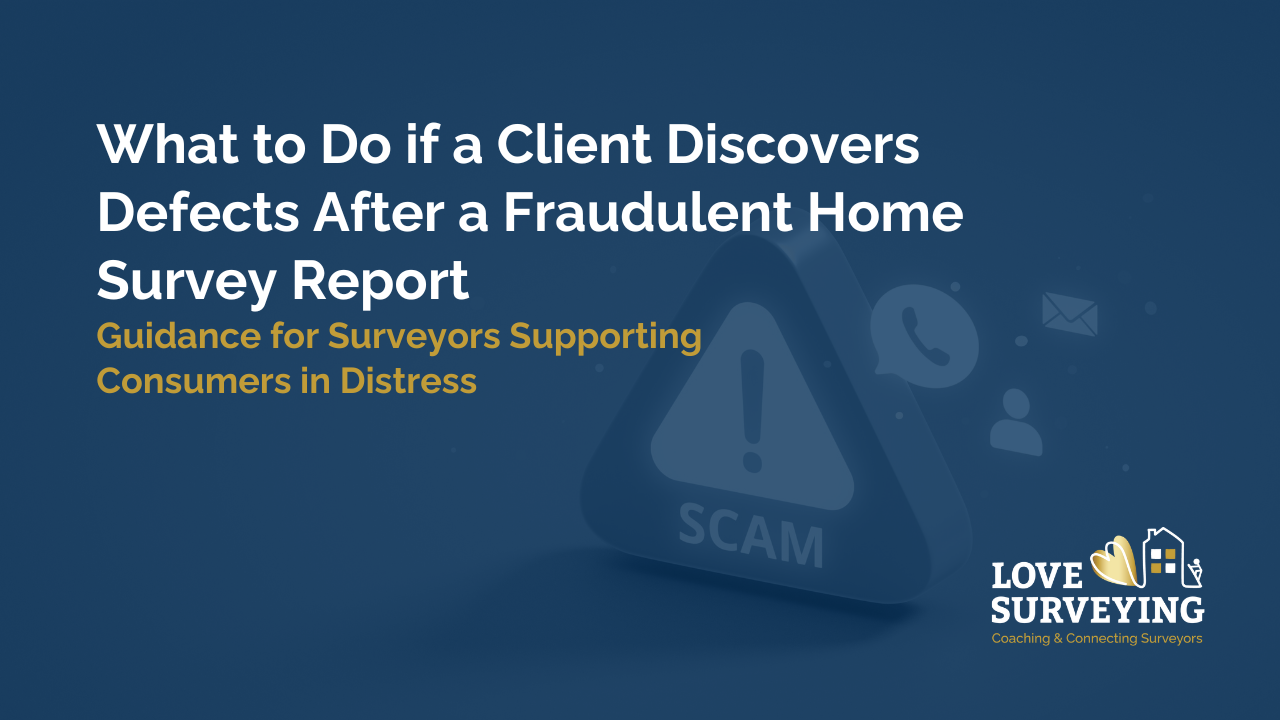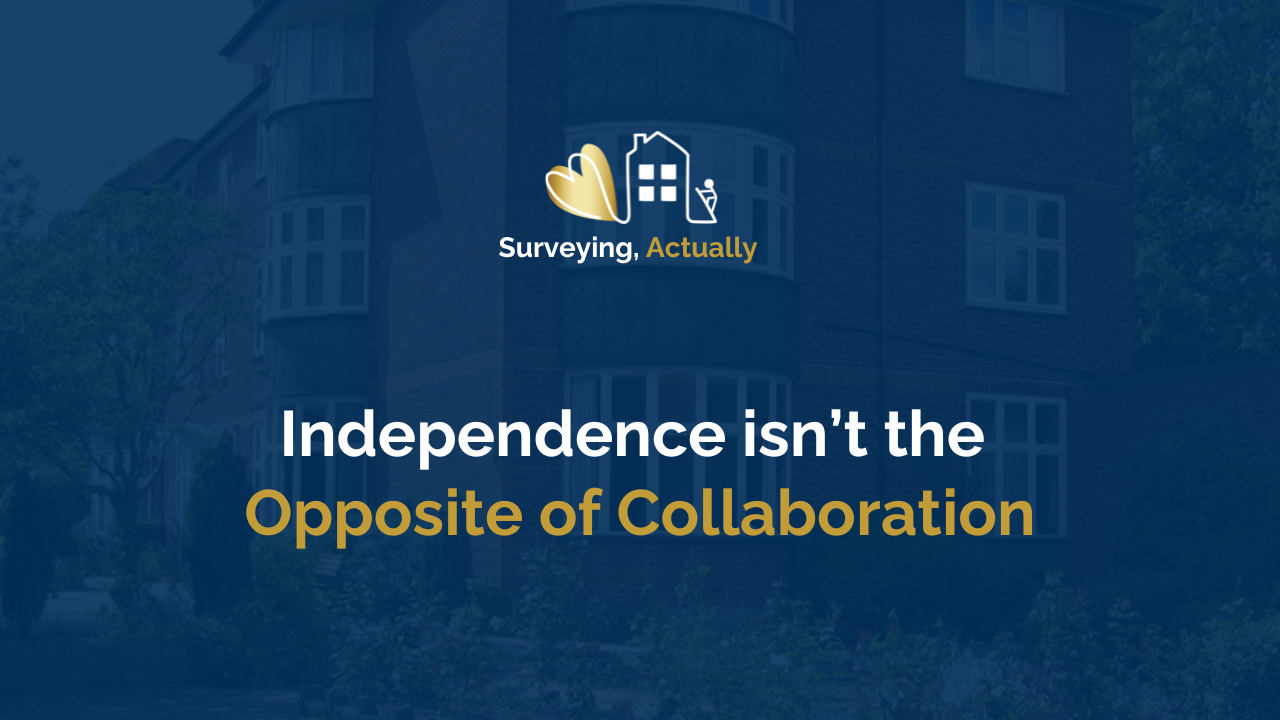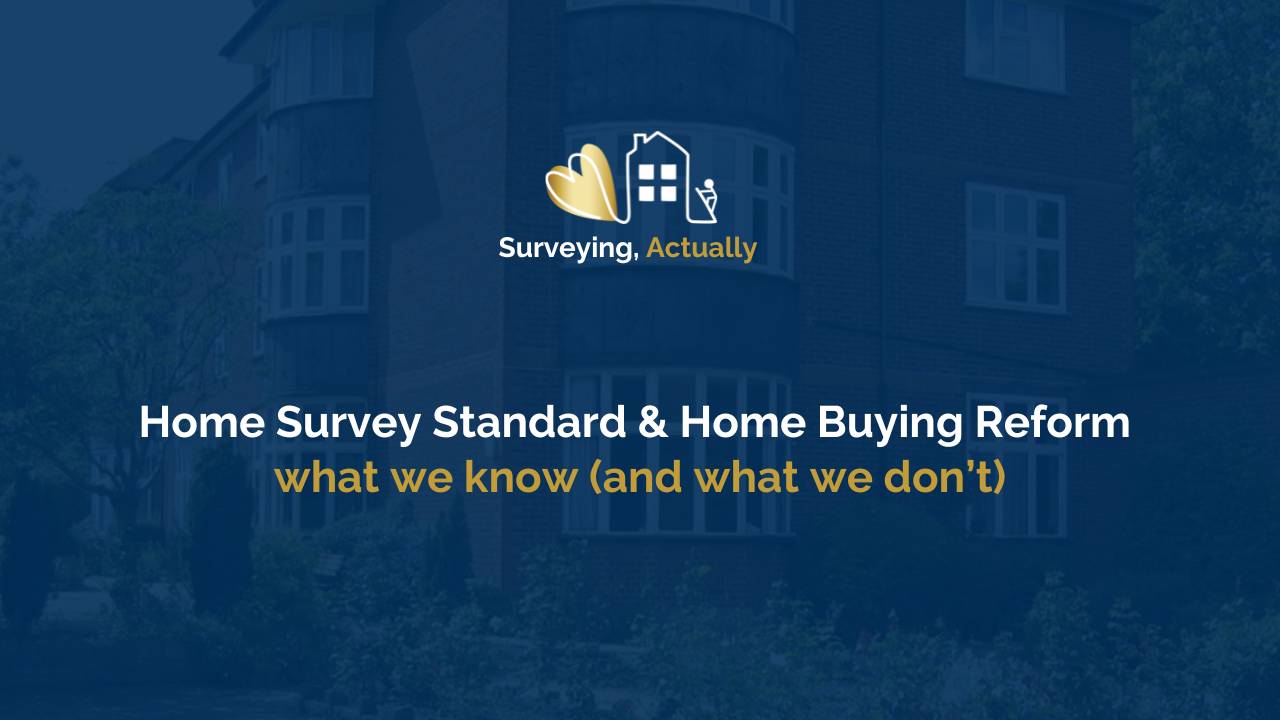What to Do if a Client Discovers Defects After a Fraudulent Survey Report
Jun 03, 2024
I feel sad about writing this article, but having been contacted by many surveyors seeking support, I felt it best to put something down. As a qualified professional, you may be approached by concerned buyers or homeowners asking for help.
This article provides guidance for surveyors who want to support and signpost consumers affected by fraudulent survey advice, helping them understand their next steps and protect others from harm.
Imagine moving into your new home, only to discover serious defects that weren’t mentioned in the survey. It’s one thing if the surveyor was qualified and regulated by a professional body - it’s quite another to discover the person you paid for professional advice wasn’t qualified, regulated, or even a legitimate surveyor. and while it might not be your problem, when it affects our reputation as a whole, it is all our of our problem.
Define Your Role First
The first thing you should do is be clear on your role and ensure that your client or the person who has contacted you asking for help understands this. Are you being helpful and signposting, or are you providing defect analysis and a report which may be used for litigation? Consumers often contact us about one thing and then use the report for another. Therefore, it is essential that if your advice is to be relied upon, you have a defined scope and relevant experience, as your advice, even verbal, could potentially be used as evidence in court. Just as with any other job, clarify the terms of your role to avoid any further confusion. Being clear protects both you and your client and helps manage expectations from the outset.
Help the Client Understand the Nature of the Fraud
It’s important to clarify whether the individual in question is genuinely fraudulent. They may be experienced but not members of a professional body like RICS, and they may still hold professional indemnity insurance. On the other hand, some may have misrepresented their credentials or used the RICS logo falsely. The client needs to understand the extent of the misrepresentation so they can consider their options for recourse, as well as how to deal with the problems they've found.
Understand and Document the Defects
Start by helping your client make sense of what they’re dealing with:
- Take photographs and notes for each issue.
- Arrange a new inspection with a qualified, RICS-registered surveyor or appropriate trade professional.
- Request a written defect report explaining what’s wrong, what caused it, and how urgent the repairs are.
- Get cost estimates and timelines for any necessary work.
- If there are concerns about health or safety (e.g., structural movement, unsafe electrics), advise them to seek immediate professional advice. In some cases, it may be appropriate to notify the local authority or mortgage lender.
Report the Fraud
Encourage the client to report the fraudulent activity. It may not get their money back, but it can help prevent others from being misled:
- Report to Trading Standards via the Citizens Advice Consumer Service.
- Report to Action Fraud and keep a record of the reference number.
- Report to RICS if the report falsely claims membership or uses the RICS logo. Misuse of the title is a serious matter and can be reported via their website.
- As a surveyor, you can also report the matter to RICS via their Speaking Up service
Collect All the Evidence
Make sure the client gathers all relevant documentation, which may be useful for legal advice or future claims:
- The original (fraudulent) survey report.
- Emails, messages, contracts or invoices from the surveyor or company.
- Defect reports from qualified professionals.
- Proof of payments for repairs and related expenses.
- Screenshots of websites, LinkedIn profiles, or advertisements referencing false credentials are important in case the content is later taken down.
Contact the Referrer
If the surveyor was recommended by an estate agent, mortgage broker, solicitor, or other professional, advise the client to:
- Follow up with that referrer and share the evidence.
- Ask how the recommendation was made and whether any referral fee was paid.
- Sometimes the referrer may have been misled, but it’s important they are made aware - especially if they continue to recommend that individual or firm to others.
Check for Insurance or Other Recourse
Explain that although the surveyor may have acted fraudulently, it’s worth checking:
- Whether the individual or company had professional indemnity insurance (check any paperwork).
- If a mortgage valuation was done, some lenders may have recourse if key issues were missed.
- Whether the vendor might be liable - if the defect was something they knew about and failed to disclose, this could be classed as material information.
Explore Legal Advice and Mediation
Encourage them to get early legal advice, especially if repair costs are significant. Useful routes include:
- Citizens Advice Bureau.
- Law centres or pro bono legal services (e.g., Bar Pro Bono Unit).
- RICS’ Consumer Helpline - although this doesn’t cover home purchases, it can still provide signposting to support.
- Small claims court for claims under £10,000.
- Mediation is a quicker and less costly option, where appropriate.
Manage Expectations - But Focus on Impact
It’s important to be honest. If the original surveyor was fraudulent, the consumer is unlikely to recover their money or repair costs through insurance. But taking action still matters:
- They may stop others from being harmed.
- They may support an investigation.
- They may trigger action against the referrer or associated companies.
Even if the outcome isn’t financial, holding someone accountable can help prevent repeat behaviour and bring some peace of mind.
Investigate Company Links
Sometimes, fraudulent surveyors 'phoenix' - shutting down one company and opening another. If your client spots the same individuals running new firms, it’s worth flagging this to Trading Standards or Action Fraud. They can also check company and director information via Companies House.
Consumer Checklist
Here’s a simple list you could share with your client to track their next steps:
- Get an independent defect inspection and report.
- Photograph and document all problems.
- Seek cost estimates and assess safety.
- Notify your mortgage lender if needed.
- Report the fraud to Trading Standards and Action Fraud.
- Contact your solicitor and ask about vendor liability.
- Follow up with the referrer and share evidence.
- Explore legal advice and mediation options.
- Be prepared that you may not recover costs, but you can help stop it from happening to others.
Be the Surveyor They Can Trust
For surveyors contacted by distressed buyers, your role isn’t to fix what happened - but your calm, informed guidance can make a real difference. By listening, explaining clearly, and offering impartial guidance, you demonstrate the value of professionalism and regulation. You aren’t just building trust; you are helping to restore it.





